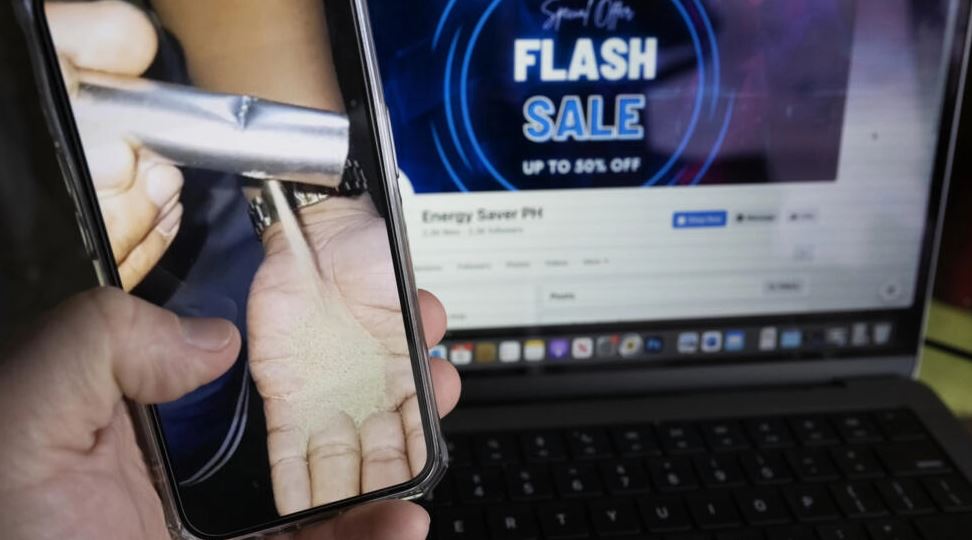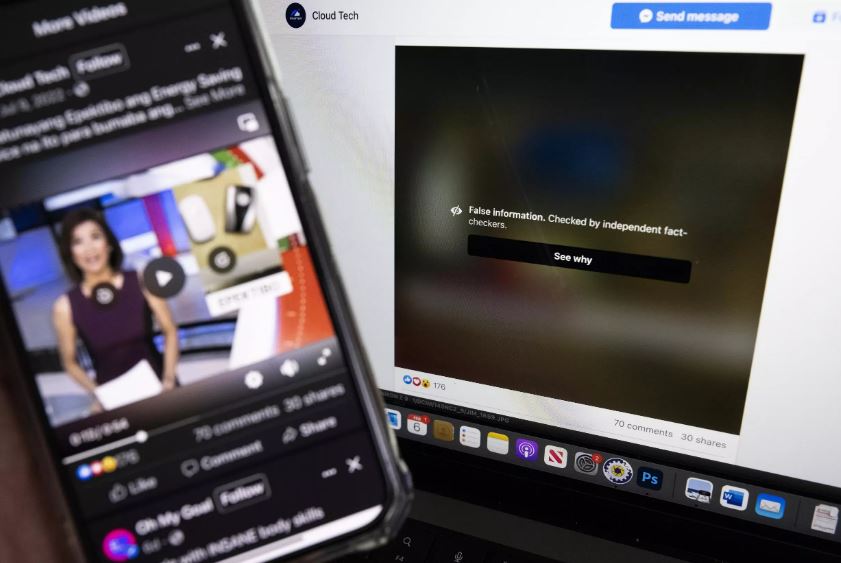AFP fact-checkers have uncovered a series of scams involving energy products that are flourishing on Facebook, from fake solar panel deals in the US to electric bicycle giveaways in Indonesia.
The scam highlights how bad actors are capitalizing on misinformation, casting a wide net to trap social media users amid a cost-of-living crisis and record-high energy and utility costs around the world.
"What they did is horrible. I was expecting a good product and they sent this," said angry 24-year-old Brenilyn Ayachock, who filmed a clip showing her power bank filled with sand.
Brenilyn Ayachock posted a clip showing a charger she bought online filled with sand. Photo: AFP
Ayachock ordered the power bank from a power retailer's Facebook page, which advertised special deals and limited-time promotions, along with environmentally friendly messages.
Ayachock said the page did not respond to her messages after selling her the fake charger for 1,500 pesos ($28) — a small fortune at a time of hyperinflation. She immediately reported the page to Facebook, but it remained active as of this week.
Ayachock is not the only victim as social media becomes a breeding ground for everything from bogus cryptocurrency ads to money and romance scams aimed at stealing people's personal data.
Last year, the Philippine government warned people to be wary of “unscrupulous” online advertisements for energy-saving devices, which have been fueled by sky-high electricity and water prices.
AFP has debunked multiple Facebook posts using fake news reports to promote a bogus energy-saving device that they claim can help reduce electricity bills.
Those warnings have fallen on deaf ears, with sales data showing thousands of such devices being sold each month. The warnings in online reviews have been drowned out by a flood of comments from people looking for ways to cut their living expenses.
Parent company Facebook is fighting fraud by removing ads and accounts linked to scammers. Photo: AFP
Amy Nofziger, director of victim assistance at AARP, a non-governmental organization in the US, said that social media has become a vast network for scammers. Most social media sites do not thoroughly check the ads placed on their pages. However, many users do not know that and they completely trust these ads.
The ease with which scammers can bombard users with misinformation has raised questions about the ability of platforms like Facebook to control fraudulent advertising, which is a lucrative source of revenue for these social networks.
Experts say algorithms that prioritize content based on individual preferences have allowed deceptive ads to attract users who are most likely to engage.
A spokesperson for Meta, the group that owns Facebook, said it takes fraud seriously and has taken measures to prevent it, including disabling several advertising accounts responsible for fraudulent activity reported by AFP's inspection agency.
“The people behind these types of ads are persistent, well-funded, and constantly evolving,” said a Meta spokesperson.
AFP news agency has a global team of journalists dedicated to debunking misinformation as part of Meta's third-party fact-checking program.
Last October, AFP exposed Facebook posts claiming to be giving away free e-bikes in Indonesia after the local government raised fuel prices. Meta said it had disabled pages and personal profiles linked to the scam.
But Hendro Sutono, a member of the Indonesian Electric Motorcycle Community group, expressed concern that fake shops offering electric bikes have sprung up like mushrooms on the platform and are difficult to detect.
“Bad actors have taken pictures of real stores and reposted them on fake accounts to give them a look of credibility,” Mr Sutono told AFP.
Mr Sutono expressed concern that the fake car dealerships could tarnish the image of electric cars to the point where people would stop using them.
In many cases in the US, scammers pose as representatives of utility companies. Last year, an Oregon-based company warned consumers that the scams were constantly evolving and that scammers were trying to target them via Facebook, Instagram, and TikTok.
According to VNA/Tin Tuc Newspaper
Source link


































































































Comment (0)